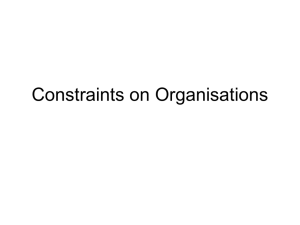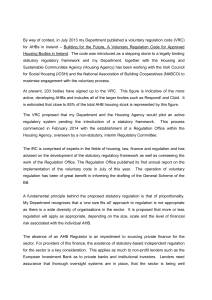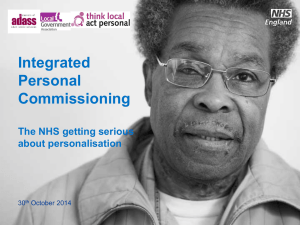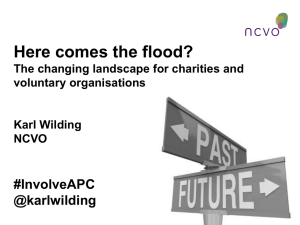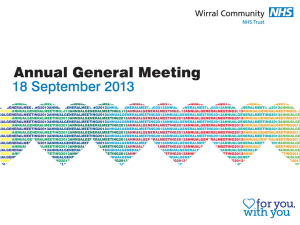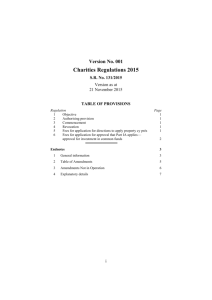About Health, Social Care and Children`s services
advertisement
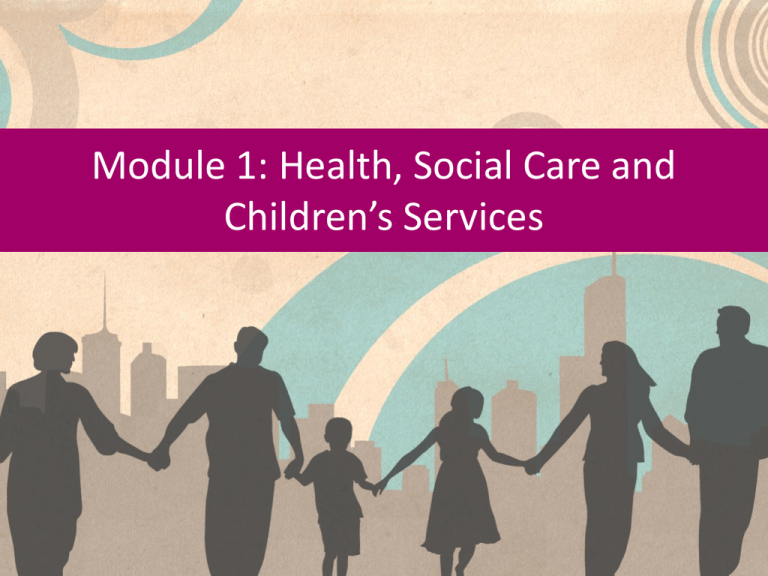
Module 1: Health, Social Care and Children’s Services The Three Care Sectors Have a look at these logos. Which organisations do they represent? What are the key differences between them? Module 1: Health, Social Care and Children’s Services Public, Private or Voluntary? Which care sector do these images show? Click on each image for the answer. The public (statutory) sector The private sector The voluntary sector Services provided by the Government and paid mainly from taxes and national insurance contributions. Services owned by individuals or larger companies, usually run for profit and funded by charges made for services. Not-for-profit services, usually provided by charities and relying on donations, lottery funding, government grants and other payments. Click on the coloured boxes for more information. Module 1: Health, Social Care and Children’s Services The Fourth Care Sector This image shows one more sector of care. Do you know what it is? Click on the image to find out. Informal care Care provided by anyone who is not paid for their services such as a relative, a friend or church and voluntary groups. Services may include washing, dressing, shopping or cooking. Click on the coloured box for more information. Module 1: Health, Social Care and Children’s Services Different Sectors Working Together Look at these images. How might different sectors work together in these situations? Social Services may contract residential care or nursing home care from private organisations. Informal carers work with the NHS to provide support for individuals in hospital, for example by bringing clean clothes and food. When different sectors work together it is called a mixed economy of care. Module 1: Health, Social Care and Children’s Services Different Sectors in Action Click on the video icon to see a clip about Tom with down’s syndrome. His mother talks about the various services he has accessed. While you watch, think about these different services and how they have affected Tom. Module 1: Health, Social Care and Children’s Services The Statutory Sector: Health Care Health care in this sector is provided in hospitals and the community by the National Health Service (NHS). Most NHS services are free at the point of delivery. Can you think of some services which you may have to pay for? Dental services ? Eye tests Services to pay for Wigs and fabric supports (surgical bra, abdominal or spinal support) ? Some ambulance journeys People with low incomes, certain health conditions or from some age groups are exempt from these charges. Click here for details. Link to BMA website Module 1: Health, Social Care and Children’s Services The Statutory Sector: Health Care Structure Primary Care Services: This is the first stage of treatment when you are ill. It is provided by services in the community e.g. health centres, opticians. Secretary of State for Health Department of Health and NHS Executive Secondary care: This is the second stage of treatment when you are ill and is usually provided by a hospital. Strategic Health Authorities NHS Trusts (Secondary Care) Primary Care Trust Primary Health Care Community Health Services GPs Dentists Pharmacists Tertiary care: This is the third and highly specialised stage of treatment, usually provided in a specialist hospital centre or hospice. Tertiary Care Secondary Health Care Opticians Hospitals Mental Health Services Learning Disability Services Tertiary Health Care Ambulances Hospices Rehabilitation Services Module 1: Health, Social Care and Children’s Services The Statutory Sector: Health Care Services What different services are available for the following user groups? Record your ideas below or click here for a blank table to complete. Adults and older individuals Babies and young children Individuals with mental health problems Click below to reveal some of the services you could include. Hospital care GPs, nurses, dentists Health Promotion Occupational therapy Podiatry Rehabilitation Family Planning Maternity services GPs, nurses, health visitors Hospital services Speech therapy Child psychology Eye services Child Protection Service Therapists GPs , psychiatric nurses Day hospital Group therapy Drop-in day centre Counseling Psychotherapists Module 1: Health, Social Care and Children’s Services The Statutory Sector: Social Services Social Services are provided by Local Authorities and paid for by central government from income tax. They are accessible 24 hours a day, 7 days a week. What different Social Services could be provided for the following individuals? Record your ideas below or click here for a blank table to complete. Older individuals Individuals with disabilities Children and families Click below to reveal some of the services you could include. Domiciliary care Transport Day care Supported/sheltered housing Domiciliary care Respite care Day care Transport Support for children with disabilities Family support Fostering and adoption services Module 1: Health, Social Care and Children’s Services The Statutory Sector: Children’s Services Local Authorities provide Children’s Services mainly through their Education Departments (LEAs). Can you think of some of the services they provide? • Free school places are provided for all children of ‘compulsory school age’ (age 5). Record your ideas here: • Free early education places are provided for 3 and 4 year olds. • Register and monitor other children’s service providers, such as private nurseries and childminders. Module 1: Health, Social Care and Children’s Services The Independent Sector: Private Private sector services operate independently from the statutory sector but must still comply with legislation and government guidelines. They are mainly run as businesses and funded by charges made for services. Can you think of some private sector services available in these three categories? Record your ideas below. Health Care Social Care Children’s Services Click below to reveal some of the services you could include. Hospitals Specialist treatment centres e.g. opticians Residential homes Nursing homes Domiciliary care Day care Nurseries Private schools Module 1: Health, Social Care and Children’s Services The Independent Sector: Voluntary Voluntary Sector organisations are charities funded mainly by donations and grants. They usually focus on particular diseases, disorders and disabilities. Look at these different care charities. Which service sector do they focus on? Health Social Care Children’s Services Can you think of some other voluntary sector organisations that offer health and social care provision? Click here for a blank table you can complete. Module 1: Health, Social Care and Children’s Services Public, Private and Voluntary Match the statements below to the correct sectors. Click each one to highlight the colour that matches the sector on the right. Funded by charges made for services Made up of Registered charities Often focus on a particular disease, disorder or disability Most services are free Funded by the Government through taxes Waiting lists for services are usually shorter Run as businesses There are some services you have to pay for Funded by donations and grants Public sector (1 click) Private sector (2 clicks) Voluntary sector (3 clicks) Provides a free school Place for children over 5 Facilities may be better The NHS is the main service provider Module 1: Health, Social Care and Children’s Services Service provision in your Local Area You have been thinking about the range of health, social care and children’s services available. Now, carry out your own research to identify and describe the provision in your local area. Click here to open blank tables you can use to record your research and produce a directory of services. Module 1: Health, Social Care and Children’s Services
